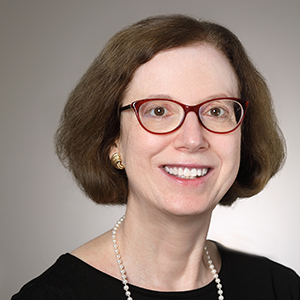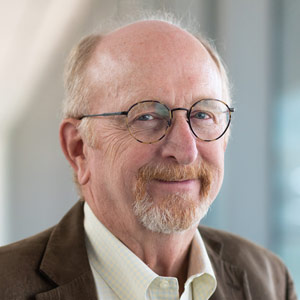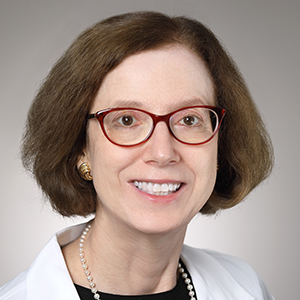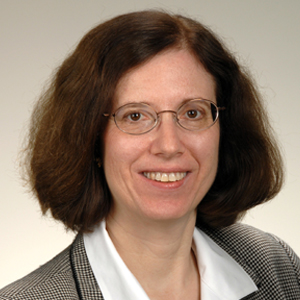An international group led by NIEHS clinical researchers was recognized as a Champion of Hope for its work on myositis, a rare autoimmune disease. The International Myositis Assessment and Clinical Studies Group (IMACS) was one of nine individuals or organizations recognized for having a positive impact on people who study or are affected by rare diseases.
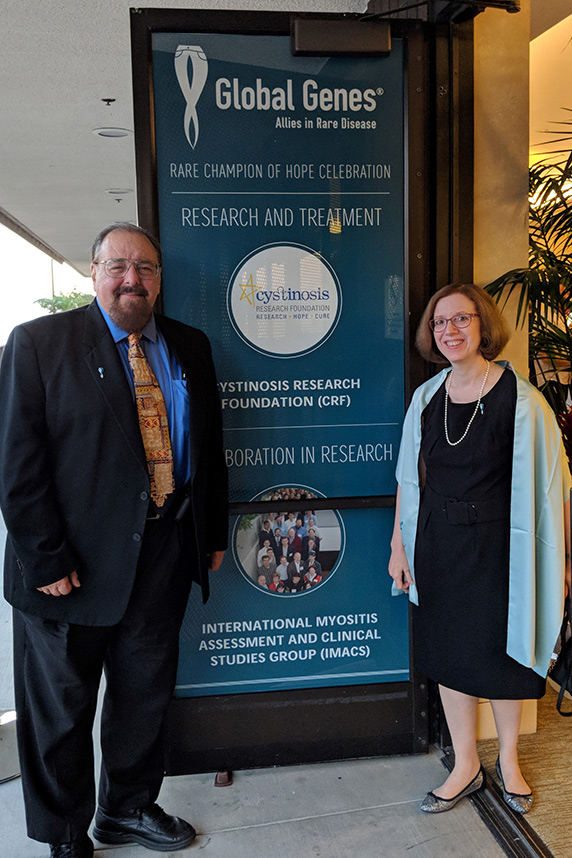 Rider, right, and Miller accepted the award on behalf of IMACS. Rider expressed gratitude for the close partnership and support of myositis patient foundations. (Photo courtesy of Tricha Shivas)
Rider, right, and Miller accepted the award on behalf of IMACS. Rider expressed gratitude for the close partnership and support of myositis patient foundations. (Photo courtesy of Tricha Shivas)The 2019 award recipients were honored at a dinner Sept. 20 following the 8th Annual Global Genes RARE Patient Advocacy Summit in San Diego. Lisa Rider, M.D., and Frederick Miller, M.D., Ph.D., the IMACS coordinators from NIEHS, accepted the award on behalf of the group and their fellow co-chair, David Isenberg, M.D., from the University College London.
“It is a great honor for this large international group of collaborators to be recognized for our many accomplishments over the last several decades,” said Miller. “From only a handful of researchers, this consortium has grown to many hundreds of experts dedicated to working together towards bettering the lives of all myositis patients.”
Rare is everywhere
Myositis is a poorly understood disease that causes chronic muscle weakness and a variety of other symptoms, including general fatigue, difficulty swallowing or breathing, and skin rashes. According to Miller, there are multiple forms of the disease, each of which likely results from different genetic and environment interactions.
Because of the complexity of myositis, identifying its risk factors, potential causes, and effective treatments can be very difficult, Miller explained. Nonetheless, with the help of its international collaborations, IMACS has developed and validated standardized measures to assess myositis. They have also described criteria of clinical response, to advance studies of new therapies.
IMACS participated in the international project to develop classification criteria for these diseases and is now working to improve understanding of and identify risk factors for other health outcomes related to myositis, which include lung disease and cancer. Developing consensus around therapies to treat these rare conditions is another important project.
Stronger together
At the September ceremony, IMACS received the RARE Champion of Hope – Collaboration in Research award. Global Genes, a rare disease patient advocacy organization, created the awards to recognize innovation in research and advocacy in rare diseases.
“As a group these disorders are quite rare, with only five to ten new cases of the disease per million people each year,” said Rider. “Only through collaboration can we accumulate enough patients, data, and material to make substantial progress. The fact that we have been able to bring together so many people to work together toward a common goal is one of my proudest accomplishments.”
Rider said in the 20 years since it began the consortium has grown to more than 450 clinical and basic science researchers, across 42 countries. “In this work, we are particularly grateful for the close partnership and support of the myositis patient foundations, particularly The Myositis Association [TMA] and the tireless efforts of Executive Director Mary McGowan, as well as The Cure JM Foundation, without whom this progress would not have been possible,” she said when accepting the award.
A panel of rare disease experts chose IMACS and the other awardees from a list of more than 100 individuals and organizations worldwide, nominated by peers for their notable efforts in rare disease advocacy, collaboration in research, science, medical care, and treatment.
“When TMA [received notification] that the nominations opened up for the RARE Champions of Hope, we immediately saw a fit for IMACS,” said McGowan, explaining the nomination.
“In today’s climate where medical institutions are competing for every dollar, it is admirable and impressive that IMACS has been able to carve out this special space to collaborate with each other and patient advocacy organizations,” McGowan said.
Citations:
Miller FW, Lamb JA, Schmidt J, Nagaraju K. 2018. Risk factors and disease mechanisms in myositis. Nat Rev Rheumatol Curr Med Chem 14(5):255–268.
Rider LG, Aggarwal R, Machado PM, Hogrel JY, Reed AM, Christopher-Stine L, Ruperto N. 2018. Update on outcome assessment in myositis. Nat Rev Rheumatol 14(5):303–318.
Aggarwal R, Rider LG, Ruperto N, Bayat N, Erman B, Feldman BM, Oddis CV, Amato AA, Chinoy H, Cooper RG, Dastmalchi M, Fiorentino D, Isenberg D, Katz JD, Mammen A, de Visser M, Ytterberg SR, Lundberg IE, Chung L, Danko K, Garcia-De la Torre I, Song YW, Villa L, Rinaldi M, Rockette H, Lachenbruch PA, Miller FW, Vencovsky J, the International Myositis Assessment and Clinical Studies Group (IMACS) and the Paediatric Rheumatology Collaborative Study Group (PRINTO). 2017. American College of Rheumatology/European League Against Rheumatism criteria for minimal, moderate, and major clinical response in adult dermatomyositis and polymyositis: an International Myositis Assessment and Clinical Studies Group/Paediatric Rheumatology International Trials Organisation collaborative initiative. Arthritis Rheumatol 69(5):898–910.
Rider LG, Aggarwal R, Pistorio A, Bayat N, Erman B, Feldman BM, Huber AM, Cimaz R, Cuttica R, Knupp de Oliveira S, Lindsley C, Pilkington PA, Punaro M, Ravelli A, Reed AM, Rouster-Stevens K, van Royen A, Dressler F, Saad Magalhaes C, Constantin T, Davidson JE, Magnusson B, Russo R, Villa L, Rinaldi M, Rockette H, Lachenbruch PA, Miller FW, Vencovsky J, Ruperto N, the International Myositis Assessment and Clinical Studies Group (IMACS) and the Paediatric Rheumatology International Trials Organisation (PRINTO). 2017. American College of Rheumatology/European League Against Rheumatism criteria for minimal, moderate, and major clinical response in juvenile dermatomyositis: an International Myositis Assessment and Clinical Studies Group/Paediatric Rheumatology International Trials Organisation collaborative initiative. Arthritis Rheumatol 69(5):911–923.
Lundberg IE, Tjarnlund A, Bottai M, Werth VP, Pilkington C, de Visser M, Alfredsson L, Amato AA, Barohn RJ, Liang MH, Singh JA, Aggarwal R, Arnardottir S, Chinoy H, Cooper RG, Danko K, Dimachkie MM, Feldman BM, Garcia-De La Torre I, Gordon P, Hayashi T, Katz JD, Kohsaka H, Lachenbruch PA, Lang BA, Li Y, Oddis CV, Reed AM, Rutkowska-Sak L, Sanner H, Selva-O'Callaghan A, Song YW, Swierkocka K, Vencovsky J, Ytterberg S, Miller FW, Rider LG, the International Myositis Classification Criteria Project consortium, the Euromyositis register and the Juvenile dermatomyositis cohort biomarker study and repository (JDRG) (UK and Ireland). 2017. European League Against Rheumatism/American College of Rheumatology classification criteria for adult and juvenile idiopathic inflammatory myopathies and their major subgroups. Ann Rheum Dis 76(12):1955–1964.
(Marla Broadfoot, Ph.D., is a contract writer for the NIEHS Office of Communications and Public Liaison.)






